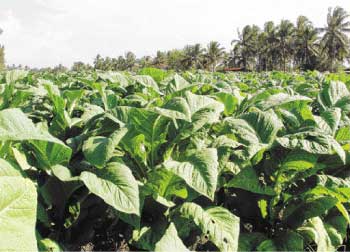New Straits Times (Malaysia)
What’s to become of them?
18 Sep 2006
SU AZIZ
Alternative farming is the key to survival for our tobacco farmers who will soon be affected by Afta’s free trade policies. SU AZIZ writes.
SOME 11,700 tobacco farmers in Malaysia - most of them in Kelantan - will be affected come 2010 when the original Asean members of Malaysia, Brunei, Philippines, Indonesia, Thailand and Singapore enact zero tariff rates on virtually all imports.

Right now, around 70 per cent of the local tobacco demand is supplied by our tobacco farmers under strict regulation and controlled pricing by the National Tobacco Board, while the remaining 30 per cent are imported.
In less than four years, with Afta’s (Asean Free Trade Area) free trade policies, the number of tobacco farmers will be reduced to around 50 per cent, bringing down the numbers to around 5,000 farmers.
Currently, under the National Tobacco Board’s controlled tobacco price, these farmers can earn up to RM9,000 for around four months’ work growing and curing tobacco leaves.
To get an equivalent income, these farmers would have to switch to growing alternative crops... but they would have to wait longer and work more since that growth cycle is definitely longer.
The weaning process has already started with the National Tobacco Board reducing the controlled price of cured tobacco sold by farmers (who are also curers) to cigarette companies in the past two to three years.
Philip Morris Malaysia (PMM) has also taken some positive steps to help these farmers. The company has already educated some 500 tobacco farmers who are “partners” of PMM on the concept of integrated farming.
Under this concept, farmers are encouraged to plant supplementary crops, rear fresh-water fish and practise animal husbandry during the eight months or so when they are not planting tobacco.
“What is to become of them?” was the question that weighed heavily on the farmers’ minds during PMM’s recent meeting with Kelantan farmers in Kota Baru.
PMM’s managing director of Malaysia, Singapore & Brunei Joe Tcheng and PMM’s leaf operations manager Abdul Adziz Hasan were on hand to answer their questions.
They were told that an agronomy programme designed by PMM called GAP or Good Agricultural Practices has been developed.
Tcheng explained that GAP “are those practices that are economically viable, safe and produce a quality crop, while protecting and sustaining the environment”.
GAP also sets a standard for farmers to ensure their yield is up to par with the imported ones - thus ensuring a competitiveness that will not leave our farmers behind.
The weaning process continues with the integrated farming concept transforming into alternative farming full-time.
Instead of relying on tobacco farming and curing as 70 per cent of their yearly revenue, these farmers have to accept the reality that at least from 2010, the larger part of their income will have to come from alternative farming.
Judging by the farmers’ questions and reactions at the gathering, it was apparent that seeing past the fact that their livelihood from tobacco leaves is disintegrating fast was somewhat difficult.
PMM might have to work even harder to get them to see a bright future is possible.
What, you may ask, is the big picture?
That it is not the end. Their income can remain as per normal, but only as long as the yield from their crop is produced according to GAP quality standards.
A do-or-die attitude may be necessary for Afta is proving to be a tough teacher. A new attitude of self-sufficiency has to be adopted.
Alternative farming is, however, not without its problems. An oversupply of one type of crop might bring down the market price which will result in financial loss for the farmers.
Here is where a continuation of the big picture is needed by ensuring the types of crops and animals farmed/reared be “spread out” carefully, if not evenly amongst our farmers.
This, of course, has to be coupled with smart marketing strategies by our national farming and agricultural bodies. Perhaps, they may even be tasked to create the demand.
The tobacco farmers were vocal about their financial worries.
Like a parent guiding a wobbly toddler, Abdul Adziz Hasan explained to the worried tobacco farmers that an initial amount will be given to them and an alternative crop farming plan has been drawn out with revenue projection planned out.
It seems frightening that Afta is dragging most of our industries, or in this case, our tobacco farmers, kicking and screaming into self sufficiency. But it is somehow vital that they do, for in today’s world, unfortunately, there is no other way to survive.